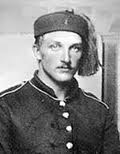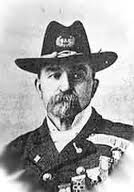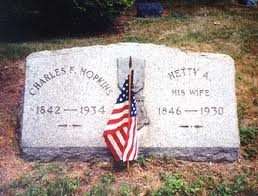 New Jersey Hero, Charles Hopkins, not only survived the Georgia POW Purgatory, that was known as Andersonville, but was also a humble and courageous recipient of the Medal of Honor. No Prisoner of War compound is a pleasant environment, it is not meant to be. The camps are normally full of enemy combatants, that desire only to be free and return home. However, one of these prisons attained an infamy that surpassed any other such facility during the Civil War, Camp Sumter or more commonly, just referred to as Andersonville. A young New Jersey Hero, not only defied the odds of surviving his incarceration, but lived to tell his story of faith, hope and his uncanny ability to overcome the horrors of day-to-day life in the Georgia Purgatory.
New Jersey Hero, Charles Hopkins, not only survived the Georgia POW Purgatory, that was known as Andersonville, but was also a humble and courageous recipient of the Medal of Honor. No Prisoner of War compound is a pleasant environment, it is not meant to be. The camps are normally full of enemy combatants, that desire only to be free and return home. However, one of these prisons attained an infamy that surpassed any other such facility during the Civil War, Camp Sumter or more commonly, just referred to as Andersonville. A young New Jersey Hero, not only defied the odds of surviving his incarceration, but lived to tell his story of faith, hope and his uncanny ability to overcome the horrors of day-to-day life in the Georgia Purgatory.
Charles Ferren Hopkins was born, May 16, 1842, in Hope, New Jersey. The son of a harness maker, young Charles had a common education of the era and began learning the leather trade from his father at age 12. The Hopkins’ family were strong abolitionists and their home was a safe house in the Underground Railroad for runaway slaves. Charles was often involved in transporting these fleeing passengers to the next underground station. The youthful harness-maker lost his mother in 1855 and his father remarried and moved to Powerville, New Jersey, where Charles secured a position with a manufacturer in Newark, enhancing his leather working skills.
In June of 1861, the New Jersey Patriot, enlisted in the 1st New Jersey infantry and after an extensive training, was promoted to Corporal in January of 1862. On June 27, 1862 at the Battle of Gaines Mill, Virginia, Hopkins’ bravery earned him the Medal of Honor, his citation reading,
“Voluntarily carried a wounded comrade, under heavy fire, to a place of
safety; though twice wounded in the act, he continued in action until again
severely wounded.”
Despite his brave efforts in the battle, he and the fellow soldier he tried to save, were still captured by Confederate forces. He was almost immediately paroled and spent several months recovering. After returning to his regiment, he was again wounded and captured during the May 1864 Battle of the Wilderness. Charles and hundreds of other Union prisoners were packed into freight cars and traveled to the prison camp at Andersonville, Georgia, arriving on May 22, 1864. Andersonville would be the young New Jersey Hero’s home for the next 10 months.
Many years after the Civil War, Charles Hopkins relates in his memoirs,
“For a God-forsaken place Andersonville tallied with the description most perfectly. Woods—from the tall and stately pine down to the starved-tp-death scrub oak and bunch pine. Woods, woods, all about us; to the east we got a glimpse of some tents of the troops that guarded the world’s greatest “Charnel House”; a winding road through sand led to the “home of the Hopeless”; a thin thread of a stream that had found its way from a loathsome-looking swamp of dead pine and cone led past the rear of the camp. This miserable, puny thread of dirty water entered the stockade with barely depth of water enough to cover a foot half buried in the sandy bottom; yet it must serve that abode of misery, starvation, and death, where thirty-five thousand human beings were crowded at one time—the only water, for all purposes, freighted as it was from the sinks of the Confederate Camp. The silence of death fell upon us who were waiting to enter where so many thousands had and would enter, and so few returned. Stronghearted, brave men who had almost gleefully faced the cannon’s mouth … here sank almost in helpless despair—some actually did, and died—yet the thought was “where others can live, we will not die!”
Hopkins describes the parameters of the compound in vivid detail,
“The prison was a parallelogram of about two to one as to its length and breadth, about eighteen acres at this time—it was enlarged July 1st to about twenty-seven acres—and one-third of this not habitable, being a swamp of liquid filth. This was enclosed by wooden walls of hewn pine logs, from eight to ten inches square, four feet buried in the ground, eighteen feet above, braced on the outside, cross-barred to make one log sustain the other, and a small platform making comfortable standing room for the guards, every one hundred feet, with above waist-high space below the top of stockade, reached by a ladder. A sloping roof to protect the guards from the sun and rain had been placed over them. Later in 1864 the second line of stockade was built and a third was partly built for protection if attacked by Federal troops, it was said, but we knew it was to discourage us from “tunneling”—the distance being too great. The Florida Artillery had cannon stationed at each corner of the stockade, thus commanding a range from any direction; four guns were so placed near the south gate and over the depressed section of stockade at which point the little stream entered the enclosure.”
The New Jersey POW remembers the smell of impending doom,
“Inside the camp death stalked on every hand. Death at the hand of the guards, though murder in cold blood, was merciful beside the systematic, studied, absolute murder inside, by slow death, inch by inch! As before stated, one-third of the original enclosure was swampy—a mud of liquid filth, voidings from the thousands, seething with maggots in full activity. This daily increased by the necessities of the inmates, being the only place accessible for the purpose. Through this mass of pollution passed the only water that found its way through the Bull Pen. It came to us between the two sources of pollution, the Confederate camp and the cook house; first, the seepage of sinks; second, the dirt and filth emptied by the cook house; then was our turn to use it. I have known over three thousand men to wait in line to get water, and the line was added to as fast as reduced, from daylight to dark, yes, even into the night; men taking turns of duty with men of their mess, in order to hold their place in line, as no one man could stand it alone, even if in the “pink” of physical condition; the heat of the sun, blistering him, or the drenching rains soaking him, not a breath of fresh air, and we had no covering but Heaven’s canopy. The air was loaded with unbearable, fever-laden stench from that poison sink of putrid mud and water, continually in motion by the activity of the germs of death. We could not get away from the stink—we ate it, drank it and slept in it (when exhaustion compelled sleep).”
Death was common place at Andersonville, as Hopkins remembers,
“The average deaths per day for seven and a half months were 85. But during the months of July, August, September, and October the average was 100 per day. One day in August, following the great freshet, I counted 235 corpses lying at the south gate and about. Many of those had been smothered in their “burrows” made in the side hill in which they crawled to shield themselves from sun and storm; the soil, being sandy, became rain-soaked and settled down upon the occupant and became his grave instead of a protection. Others, who had no shelter, in whom life was barely existing, were rain-soaked, chilling blood and marrow, and life flitted easily away, and left but little to return to clay. These holes or burrows in both the flats and up the north slope were counted by thousands; no doubt there were some that never gave up their dead, the men buried in their self-made sepulcher. No effort was made to search unless the man was missed by a friend.”
 The New Jersey Hero, was transferred to the prison camp at Florence, South Carolina, in February of 1865, exchanged and finally discharged on April 21, 1865, at Trenton, New Jersey. Hopkins’ had enlisted at 226 pounds and had lost over 100 pounds, a mere shadow of his former self. He could barely walk and only managed with a cane. His family had been informed that he died in prison and his own letter, from Camp Parole, arrived three days before the funeral service that had been planned for him.
The New Jersey Hero, was transferred to the prison camp at Florence, South Carolina, in February of 1865, exchanged and finally discharged on April 21, 1865, at Trenton, New Jersey. Hopkins’ had enlisted at 226 pounds and had lost over 100 pounds, a mere shadow of his former self. He could barely walk and only managed with a cane. His family had been informed that he died in prison and his own letter, from Camp Parole, arrived three days before the funeral service that had been planned for him.
 Charles Hopkins served as Mayor of Boonton, New Jersey and in the New Jersey State Legislature and finally received his Medal of Honor on July 9, 1892. Hopkins stayed active in honoring his military comrades for the remainder of his life and was the last surviving New Jersey Civil War Veteran when he died on February 14, 1934. Hopkins is buried at the Greenwood Cemetery in Boonton.
Charles Hopkins served as Mayor of Boonton, New Jersey and in the New Jersey State Legislature and finally received his Medal of Honor on July 9, 1892. Hopkins stayed active in honoring his military comrades for the remainder of his life and was the last surviving New Jersey Civil War Veteran when he died on February 14, 1934. Hopkins is buried at the Greenwood Cemetery in Boonton.
New Jersey Hero, Charles Ferren Hopkins, not only survived the Purgatory of Georgia, but his fortitude and faith are indicative of his personal Patriotism that eventually brought him home alive, when so many others didn’t.
Bummer


Did Hopkins believe that the conditions at Andersonville were intentional (they wanted it be be that savage)? Wondering if he supported Wirz’s trial and execution. I’m sure I would have in his case.
Louis,
There is much more detail in Hopkins’ Memoirs regarding the intentional and premeditated savage torture and intended extermination of Union prisoners at Andersonville. He surely would have supported not only the prosecution and execution of Wirz, but the previous commandants and staffs at Camp Sumter.
As Always,
Bummer
05/31/13 After reading Charles Hopkins’ remarkable CW experience, I noted that he served in the same N.J. Vol Inf Regt as may maternal GF, Pvt Edward F. Dougherty,in the Spanish American War (Co C, Ist N. J. Vol Inf Regt) in 1898. When he was 6 yrs old (1883), he was injured in a pubic stampede on the Brooklyn Bridge,one week after it opened, when he got separated from his Mother in a crowd walking across the bridge from Brooklyn to NYC.
John,
Thanks for following and the info regarding your GF. Hope more subjects like Hopkins can be discovered.
Bummer